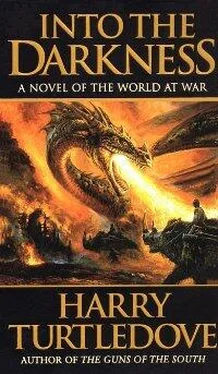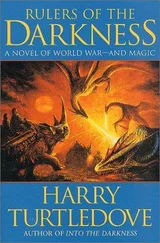Talsu dashed toward the tent. So did everyone else who’d heard Vartu. There lay the naked and unlovely Count Dzirnavu, half on the bed, half off, his throat cut from ear to ear. Blood soaked the sheets and the ground below. There was no sign of the Algarvian woman, no sign she’d ever been there but for the length of rope tied to each bedpost.
“An assassin!” Vartu gasped. “She was an assassin!”
No one argued with him, not out loud, but expressions were eloquent. Talsu’s guess was that Dzirnavu had fallen asleep because of his exertions, the woman had managed to work a hand free, and then had found a tool to take her revenge. He did wonder how she’d managed to escape afterwards. Maybe she’d been able to sneak past the sentries. Or maybe, in exchange for silence, she’d given out some of what Dzirnavu had taken by force. Any which way, she was gone.
Smilsu had the last word. He saved it till he and Talsu were heading up to the front: “Powers above, the Algarvians wouldn’t want to murder Dzirnavu. They must have hoped he’d live forever. Now we’re liable to get a regimental commander who knows what he’s doing.” Talsu considered that, then solemnly nodded.
Garivald’s worn leather boots squelched through mud. The fall rains in southern Unkerlant turned everything into a swamp. Spring, when a winter’s worth of snow melted, was even worse—though the peasant did not think of it that way. The weather did what it did every year. For Garivald, it was simply part of life.
As a matter of fact, he was on the whole pleased with the way the year had gone. King Swemmel’s inspectors had gone away and not come back, and no impressers had arrived in their wake. The villagers of Zossen had got in the harvest before the rains came. Waddo the obnoxious first-man had fallen off the roof while he was rethatching it, and had broken his ankle. He was still hobbling around on two sticks. No, not such a bad year after all.
The pigs approved of the year, too, or at least of the ram. The whole village might have been a wallow for them now. They approved of Garivald, too, when he threw them turnip tops from a wicker basket.
The only trouble was, each seemed to think its neighbors had got a better selection of greens, which made for snortings and snappings and loud grunts and squeals.
Garivald had grain for the chickens, too. The chickens did not like rain, as their draggled feathers attested. A lot of them had taken shelter inside one peasant’s house or another. Some of them were making a racket and a mess inside his house. If they annoyed his wife enough, Annore would avenge herself with hatchet and chopping block.
When the blizzards came, all the animals would crowd into the houses. If they didn’t, they’d freeze to death. The warmth they gave off helped keep the villagers alive, too. After a while, the nose stopped noticing the stink. Garivald chuckled. Had those hoity-toity inspectors come in winter, they would have stuck their noses into any old house, taken one whiff, and fled back to Cottbus with their tails between their legs.
Syrivald was playing in the mud when Garivald got back to his family’s house. “Does your mother know you’re out here?” he demanded.
Syrivald nodded. “She sent me out. She said she was sick of the way I was driving the chickens crazy.”
“Did she?” Garivald let out a grunt of laughter. “Well, I believe it. You drive your mother and me crazy sometimes, too.” Syrivald grinned, mistaking that for a compliment.
Rolling his eyes, Garivald ducked inside. Even with Syrivald out getting filthy, the chickens remained in an uproar. Leuba was crawling around on the floor, doing her best to catch them and pull out their tail feathers. Garivald’s little daughter thought that great sport; the chickens had a different opinion.
“You’re going to get pecked,” Annore warned Leuba.
Two years from now, Leuba might, on a good day, pay some attention to a warning. Now she didn’t even understand it. Her mother’s tone might have meant something, but not when she was intent on her game. “Ma-ma!” she said happily, and went right on after the closest chicken.
The chickens were a lot faster than she was, but she had a singleminded determination they lacked. Garivald was heading toward her to pick her up when she did manage to grab a hen by the tail. The hen let out a furious squawk. An instant later, Leuba started crying: Sure enough, it had pecked her.
“There, see what you get?” Garivald scooped her off the ground. Leuba, of course, saw nothing of the sort. As far as she was concerned, she’d been having a high old time, and then one of her toys unaccountably went and hurt her. Garivald examined the injury, which was minor. “I expect you’ll live,” he said. “You can stop making noises like a branded calf.”
Eventually, she did settle down, not so much because he’d told her to as because he was holding her. When he set her down again, she started after the nearest chicken. This time, luckily for her and the fowl, it spied her and escaped.
“She’s a stubborn thing,” Garivald said.
Annore looked at him sidelong. “Where do you suppose she gets that?” Garivald grunted. He didn’t think of himself as stubborn, except insofar as a man had to work hard to scrape a living from the soil. “What’s for dinner tonight?” he asked his wife.
“Bread,” she answered. “What’s left of last night’s stew is still in the pot: peas and cabbage and beets and a little salt pork thrown in for flavor.”
“Any honey for the bread?” he asked. Annore nodded. He grunted again, this time in satisfaction. “Well, that won’t be too bad. And the stew was good last night, so it should be good again today.” He sat down on a bench along the wall. “Get me some.”
Annore had been stuffing guts with ground meat for sausages. She set aside what she was doing, got a bowl and a spoon, went over to the iron pot hanging above the fire, ladled the bowl full, and brought it to Garivald. Then she went back to the counter, tore off a chunk of black bread, and carried that and the honey pot over to him, too.
He broke the bread, dipped some in the honey, and ate it. Annore went back to work. Garivald spooned up some of the stew, then ate another piece of bread. “In the cities,” he said, “they make fancy flour so they can have white bread, not just black or brown.” His broad shoulders went up and down in a shrug. “I wonder why they bother. By what I hear from people who’ve eaten it, it’s no better than any other kind.”
“City people will do anything to be in fashion,” Annore said, and Garivald nodded. People in the farming villages where most Unkerlanters lived were deeply suspicious of their urban cousins. Annore went on, “I’m glad we live in the same way our grandparents did. Why borrow trouble?”
Garivald nodded again. “That’s right. I’m not sorry there aren’t any ley lines close by, or that Waddo hasn’t been able to put a crystal in his house. What can you hear on a crystal? Only bad news and orders from Cottbus.”
“Orders from Cottbus are bad news,” his wife said, and he nodded once more.
“Aye. If somebody there could tell Waddo what to do without coming here, Waddo would just up and do it, no matter how hard it was on the village,” he said. “Waddo’s one of those people who kicks every arse below him and kisses every arse above him.”
He waited for Annore to answer. She didn’t; she was peering through tiny gaps in the shutters drawn tight against the rain. After a moment, she opened them wide so she could see better. Surprise in her voice, she said, “Herpo the spice man’s here. I wonder what possessed him to come in the middle of the rains.”
“Some of those people just have itchy feet—they go when and where they choose,” Garivald said. “Never could see the sense of it myself; I’ve always been happy to stay right where I am.” But he finished eating in a hurry, while Annore was plopping Leuba in her crib and putting on her own rain cape and hat. They started to go out together to see Herpo. Leuba squalled angrily. Annore gave a martyred look and went back to pick up the baby.
Читать дальше












